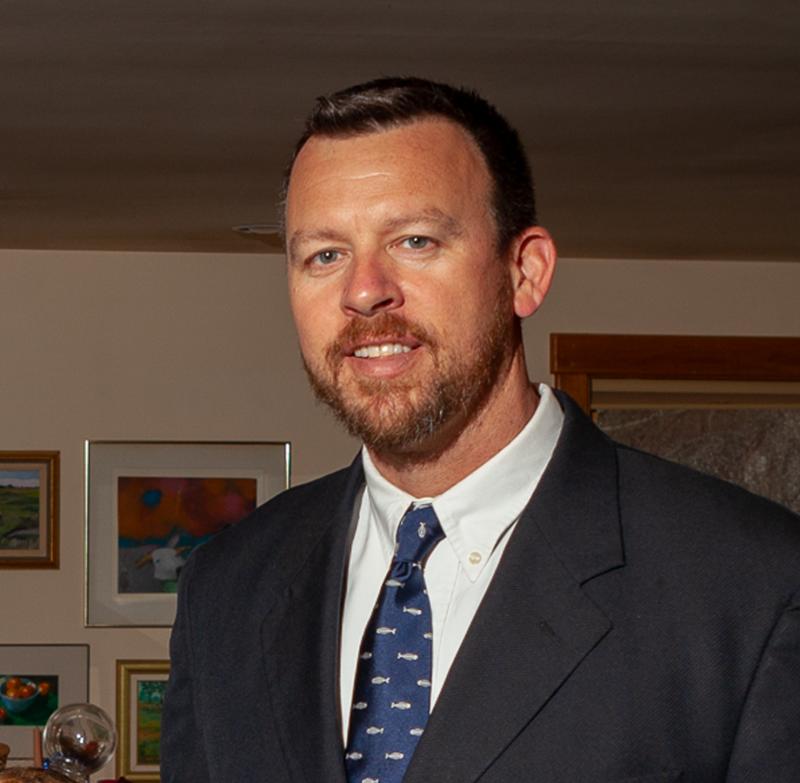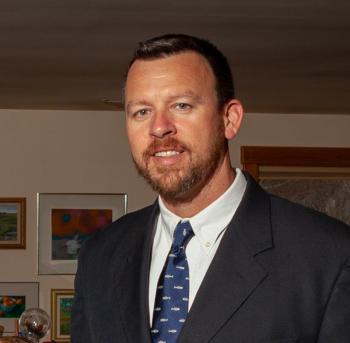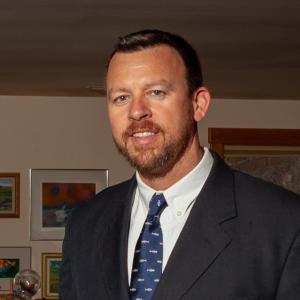Rockport man puts rental safety first
ROCKPORT – Justin Ford, of Rockport, is no stranger to rental properties, nor to safety. With more than 20 years of combined experience as a member of the United States Coast Guard, a volunteer firefighter and the owner of a successful vacation rental agency, Ford’s unique experience has bestowed him with a unique skill set and a passion for a niche that Ford said is often overlooked: vacation rental safety.
“Rental safety is huge at the moment; vacation rentals are currently the most dangerous segment of travel,” Ford said, explaining that he started his company Dwell Safe Inc. in 2018. “Who is responsible for safety when you are opening your home up to the general public?”
Ford said that his background is well-suited to the innovative venture, and that after his former spouse purchased from him the Rockport-based vacation rental company, On The Water in Maine, that the pair had started together, he was inspired to pursue his passion for safety and his comprehensive knowledge of the rental industry.
“I have been able to combine four years in the Coast Guard, 15 years on the Rockport Fire Department and 20 years in the vacation industry with the creation of Dwell Safe,” he said. “It’s a really unique combination.”
Ford said that Midcoast vacation rental managers, including Audrey Miller, of Cottage Connections, Jennika Lundy, of Bayside Cottage Rentals, Barbara Heard, of Camden Accommodations, and Fletcher McNaboe, of SumerMaine, worked together to be at the forefront of rental safety. In an area where vacation homes are abundant and where both private, professional and online rental agencies flourish, Ford said it became evident to that group of midcoast rental agency owners, and others, that there was a need for some general standard of safety in vacation rentals.
He said that in 2014 a statewide group of Maine rental agents, including Miller, Heard and McNaboe, met to come up with a rental safety checklist. The group was called the Vacation Rental Professionals of Maine but has now evolved to include managers across New England as the Northeast Vacation Rental Professionals.
“It was an innovation,” he said. “Maine was the first state to consider this. I was the firefighter in the group, so naturally, the safety checklist came to me to create. After we did it in Maine, others across the country learned about it and asked me to come speak to them about how they could implent rental safety protocols in their localities. Till now, its mostly been the professional rental agencies that are addressing safety, because they are experienced in knowing about the more accident-prone areas of a vacation rental.”
Since then, safety accidents in vacation rentals nationwide have been the subject of large lawsuits, even suits implicating municipalities, Ford said.
“AirBnb just announced that 295,000 people stayed in an Airbnb vacation rental in Maine this summer, twice the number from 2017, and Airbnb doesn’t even market the majority of vacation rentals in the state. How many of those renters stayed in a vacation rental that was truly safe? How many knew that that the rentals they stayed in probably weren’t inspected or certified for safety?“, Ford asked.
He explained that Dwell Safe has realized near-instant success and that he has traveled all over the United States and internationally to consult, even meeting with companies including VRBO (HomeAway recently changed their name to VRBO a division of Expedia).
“I have been learning about different safety issues in different places,” he explained. “My goal is to make vacation rental properties universally safe.”
He said that common, preventable issues include falls from a lack of exterior lighting, deck collapses, pool drownings and disabled smoke alarms.
“The number one claim submitted to insurance companies for vacation rental injuries is related to falls,” he said. “ There is a real problem out there of a lack of handrails meeting building codes at vacation rentals. In Maine, even though there is no building code, your vacation rental must still meet national building code standards or you are liable for injuries as a result of accidents from items not meeting code.”
Ford is visibly passionate about his work and about educating and protecting rental property owners and their tenants. He explained that much of the time a homeowner will set up a rental home in a way that is familiar to them but once looked at with objectivity can pose a host of hazards.
He cites a children’s bedroom with a large television that is situated in a precarious way, using a photo to illustrate.
“Just one tug and this could fall and easily injure someone,” he said.
Another example Ford uses is a large, heavy ornamental mirror leaned against a family room wall. In a video, Ford has filmed how he can tip the mirror forward with just one finger, citing yet another significant hazard.
“Shabby Chic [decor] has no place in a vacation rental when it creates a dangerous condition like that,” Ford said.
Many of the hazards in rental homes are due to homeowners landlords who simply think of the rental as an extension of their own familiarity with the house, not realizing that an unfamiliar family, just in for the week, may not know the quirks or layout of the home, creating numerous innocent and unintentional risks, he said.
Ford developed a specialized app and checklist to guide homeowners through the process of making their vacation rentals safe for renters. He said that a subscription to the app costs $89 annually and the program requires a geotagged photo submission. The geo tags of each photo act as insurance that they are actual photos of the rental property in question. He works with owners to meet safety standards using this mechanism and works with owners to fix apparent safety issues that he detects in the app submissions.
“The two things that are most important are life safety and injury prevention,” he said. “Once you are working with Dwell Safe you have made a commitment to meet certain guidelines for safety and we will certify your vacation home as ‘safe’ if you meet our requirements.”
Ford highlighted that he is already working with insurance providers, such as Proper Insurance, that specialize in vacation rental home insurance to provide a 10 percent discount on the annual insurance premium for home owner’s policies covering vacation homes if the owners satisfactorily complete the Dwell Safe certification program.
He was quick to explain that Dwell Safe is not competing with home inspections or livability inspections. At present, the company is exclusive to vacation rental safety and does not offer services for long term rentals.
“Home Inspections are great, and that is the first step that every vacation rental homeowner should take when they decide to list their home for rent – get a home inspection, and do it again every five years,” Ford said. “But, that’s only 50 percent of the inspection need. Dwell Safe picks up and inspects the other 50 percent, livability items like deck chairs, carpet trip hazards, hot tub cover locks, domestic water temperature, grill placement, that home inspectors don’t check for.”
Ford said that with the uptick in measures to prevent incidents and make rental properties safer, the liability no longer falls solely on an insurance company.
“The big message that I want to get across is that [property owners] are no longer exempt from negligent homicide charges if they are offering an unsafe vacation rental and someone dies as are the result of an unsafe condition in the rental home,” he said. “Vacation rental home owners can’t say, ‘I didn’t know the railings in my rental had to be code to prevent a fall’ and expect to be immune from losing lawsuits as a result of accidents that follow. Insurance companies aren't going to back you if preventable safety issues weren't addressed in your rental.”
One example Ford cited is a vacation home insurance carrier that now requires that renters sign a waiver before using a top bunk in a vacation rental and that unless that top bunk has safety rails, the renters can't use it.
"If that homeowner allows the renters to use that top bunk and a child falls out and gets injured without a signed waiver, that insurance company isn't going to cover the medical and injuries claims," Ford said.
Safety laws and regulations vary from city to city, a challenge unto itself, he said. Some municipalities have significant safety protocols while others are more relaxed.
“Bar Harbor has a great vacation rental safety ordinance they just put in place this year,” he said. “It’s actually the best [set of] safety requirements for vacation rentals in the state right now. If I were a vacationer coming to Maine, I would want to stay in Bar Harbor because that is where the certified safest vacation homes are.”
He hopes local towns will follow suit.
“Towns should be fighting to get renters to come stay in their towns because they are ‘safer’ than others, because of regulations, they have imposed to ensure the safety of rentals in their towns,” he said.
Ford cited that because of his line of work, friends, and family often reach out to him to point out safety issues they find in vacation rentals when they travel.
“A friend sent me a photo the other day of an Airbnb cottage rental in Hope he arrived at to rent that was only supported up on 2-ton hydraulic jacks,” said Ford. “The jacks were sitting in the dirt on a slope towards the lake. That is very dangerous. One picture showed the wood for the support for the dock ramp was cracked. Two adults standing on it could lead to a break and have them toppling on to the rocky lake shore bank leading to serious injury. If that cottage were inspected by even a house inspector, let alone my Dwell Safe program, it would never have been certified to rent.”
Ford used his phone to point out properties listed with sites, including Airbnb that have notable exclusions, amenities listed omit smoke and carbon monoxide detectors and yet the properties are still advertised as safe, family-friendly rentals.
Ford himself is no stranger to the perils of rental issues.
During his tenure as a property manager he had a client experience a bad accident when support for a hammock broke free causing a severe injury. The incident occurred in 2013 and Ford said it was a real call to action, particularly for an individual who has spent a large portion of his career looking out for the safety of others.
While Dwell Safe relies on the features of its specialized app to guide state regulators, municipalities, homeowners, rental agents and property managers through safety checklists, Ford said he rarely does an onsite property inspection unless special arrangements are made.
"We're working with states, counties, cities, and towns across the US and Mexico that want to require our inspection certifications. Right now, most government agencies rely on fire marshals or code officers to check for safety, but that is taxing on those resources. So, we make it easier for them by doing the safety certifications for them," Ford said.
He recounted inspecting a number of properties in a beach town in Oregon. He said he immediately discovered that there was a trend of vacation rental homeowners there putting their gas barbecue grills under enclosed porch roofs.
“Gas grills shouldn’t be up on a wooden porch, and they should never be under a porch roof. They need at least nine feet of overhead clearance and should be 10 feet away from a combustible structure.”
“One big save I had recently actually made me feel pretty awesome,” Ford said.
He recounted checking out a second story deck at one property in the Outer Banks of North Carolina.
“The deck was attached to the house with just nails,” he said. “I jumped just once on the deck and it completely separated from the house. Guests were due to arrive at the house within hours. This wasn’t the first deck collapse I have thwarted, I actually thwarted an even bigger one in Maine earlier this spring at a vacation rental.”
Being at the forefront of the vacation rental industry has bestowed Ford with opportunities that only a true innovator might be afforded. In addition to working with some of the largest online travel and rental companies in the world, Ford has also been a featured speaker at conferences including – most recently– the Smart City Policy Conference in Austin, Texas, where he spoke before many of the nation’s mayors on the need for ordinances that cities should implement to ensure they offer safe vacation rentals in their cities.
Additionally, he has contributed articles to numerous industry and travel publications.
Part of building his business is conducting focus groups to learn what home owners, insurance companies and rental agencies most want to focus on. He has led such groups all over the U.S. and some internationally.
“In the industry everyone knows me as ‘the Safety Guy,” Ford said, with a chuckle.
Ford said that major innovations in home and vacation rental safety are presently underway, including new smoke detectors that are less sensitive to cooking errors. According to Ford, renters often remove the batteries from such alarms after burning food, creating risk not only to themselves but the renters that follow if the batteries are not replaced when they vacate.
“The smoke alarm is undergoing the biggest change since 1976. Everyone, not just vacation rental homeowners, needs to learn about the new 2020 UL Safety Standards for smoke detectors,” he explained. “Your new smoke detectors need to be UL-217 and 268 certified. Kidde has already put to market some of these new detectors on the market under the ‘TruSense” brand.
Ford explained that many of the online rental platforms choose to stay somewhat removed from the safety items of the specific rentals that are listed with them.
“Essentially, companies like Airbnb want to offer a listing service but also avoid any bad press,” Ford explained. He harkened back to the listings he referenced earlier in the interview – listings where options such as smoke detectors were not among the amenities offered.
“Safety shouldn’t be an amenity or a luxury.” Ford said. “Airbnb lists safety items under the ‘Amenities’ category and they only address 4 items: fire extinguishers, C0 detectors, smoke detectors, and first aid kits. Those aren’t amenities, they are just the tip of what is required to ensure safety for guests in the rentals. The paying public has the right to have some reasonable feelings of trust,” he said.
Ford provided a hypothetical situation in which a family was traveling to a vacation rental.
“You’ve been driving all day, you pull into a vacation rental you’ve never been to before in a new town and neighborhood. You’ve battled traffic for hours, you run back out to grab some groceries. You don’t really know the lay of the land [in your rental]. That night, you and your family go to sleep, exhausted after the travel and settling in. What if there is a fire at 2 a.m.? Are the smoke detectors working? Will they wake you? Can you easily escape? [Renters] trust that they are safe, but who has made sure they are safe?”
He explained that when you arrive at a hotel those concerns are alleviated to an extent by the regulations and staffing. Because of that, most renters assume vacation rentals meet the same standards since they are also paid lodging.
“All the tools and products are there to make vacation rentals safe, I just want to educate people on using them.” He said. “Again, the goal is to make rentals as universally as safe as possible.”
To learn more about Dwell Safe Inc. or Justin Ford, or to receive more information, please visit the Dwell Safe Inc. website. You can also follow them on Facebook.
Reach Jenna Lookner at jlooknercopy@gmail.com
Event Date
Address
United States


























